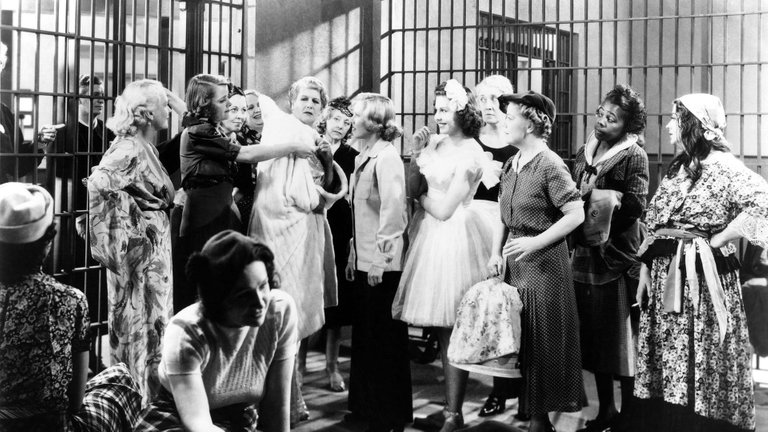Film Review: You Can't Take It with You (1938)

If a filmmaker is talented enough, even some of their great and highly regarded works can look like lesser parts of their filmography. For Frank Capra, grand master of populist comedies in Classic Hollywood, one of such great works, nowadays neglected in comparison with others, is his 1938 Oscar-winning film You Can't Take It with You.
The plot is based on the eponymous 1936 Pulitzer Prize-winning play by George S. Kaufman and Moss Hart. The plot begins when wealthy and influential banker Arthur P. Kirby (played by Edward Arnold), after securing a lucrative munitions production contract for his clients, continues with the scheme to crush competitors by buying property around their factory. The only holdout is a house owned by Grandpa Martin Vanderhof (played by Lionel Barrymore), once a successful businessman who one day decided to quit his career and dedicate himself to his hobbies and things that are fun, inspiring his family members to do the same, as well as a group of eccentrics who live with him. The only part of the Vanderhof family that leads a conventional lifestyle is granddaughter Alice Sycamore (played by Jean Arthur) who works as a stenographer at Kirby's bank. There she met and began a romantic relationship with Kirby's son Tony (played by James Stewart) who decides to marry her. His plan to introduce his father and mother Meriam (played by Mary Forbes) to his eccentric future in-laws ends disastrously.
Like It Happened One Night, Capra's previous Oscar-winning populist comedy, You Can't Take It with You was written by his old associate Robert Riskin. The content of the film was clearly tailored for the majority of the American audience and reflected the popular sentiments and concerns. The most obvious is the still ongoing Great Depression and the widening chasm between the upper classes, represented by the Kirbys, and lower classes, represented not so much by Vanderhof and his eccentric proto-hippy commune but by ordinary people that live in his neighbourhood and give them support in the final segments of the film. Another popular sentiment is pacifism and the idea that the destructive world wars are caused and fuelled by the greed of the arms industry and what we today call the Military Industrial Complex. Finally, through the words of Vanderhof, who openly rejects "communism, fascism and other isms" for the sake of "Americanism", You Can't Take It with You espouses American traditional values that are, in many ways, conservative and isolationist. Another detail, that would stick out like a sore thumb in today's America, is Vanderhof's defiant refusal to pay taxes which makes him a radical libertarian and dangerous extremist in the eyes of those who shape public opinion and policies in today's world.
Despite all those serious issues in the background, You Can't Take It with You is actually a very funny, entertaining and generally spirit-lifting film. This could be attributed to Capra's directing skills that result in the film easily transcending its theatrical roots. The rhythm is fast and the comic timing superb, resulting in two hours of running time passing very quickly. But the greatest work is done by the great and diverse cast. Lionel Barrymore, one of the greatest actors of his time, excels in the role of the eccentric yet wise patriarch with whom the audience can't fail to sympathise. Edward Arnold is also great in the role of the villain who would ultimately be transformed by his encounters with people whose lifestyle and values represent the antithesis to his own. The script cleverly puts those two great actors to best possible use by giving emphasis to their respective characters in different parts of the film. The supporting cast is also great, which includes the elderly Donald Meek as a work-frustrated accountant who joins Vanderhof's community, Mischa Auer as an exiled Russian ballet teacher and 15-year-old Ann Miller in the role of Vanderhof's adult granddaughter who takes seemingly futile ballet lessons. The weakest part of the cast are James Stewart and Jean Arthur, mainly because the romantic subplot seems like an artificial addition to an already interesting and intriguing story. Stewart's performance, however, still radiated enough of the actor's all-American innocence and charm, which were qualities well-recognised by Capra and later used by him in some of his future classics. Capra also used Stewart and Barrymore eight years later in his best known film It's a Wonderful Life and because of that You Can't Take It with You is today by some critics and film scholars viewed as a sort of a dry run for Capra's future masterpiece. Ironically, while It's a Wonderful Life initially turned into a flop only to later become a classic via television, You Can't Take It with You, despite winning the Oscar for Best Film and Capra taking the Oscar for Best Director, is nowadays one of the lesser known Capra works. However, those who give this film a chance nevertheless have the opportunity to see a grand director and top Classic Hollywood craftsmanship at work.
RATING: 7/10 (+++)
Blog in Croatian https://draxblog.com
Blog in English https://draxreview.wordpress.com/
Leofinance blog https://leofinance.io/@drax.leo
Unstoppable Domains: https://unstoppabledomains.com/?ref=3fc23fc42c1b417
Hiveonboard: https://hiveonboard.com?ref=drax y
Bitcoin Lightning HIVE donations: https://v4v.app/v1/lnurlp/qrcode/drax
Rising Star game: https://www.risingstargame.com?referrer=drax
1Inch: https://1inch.exchange/#/r/0x83823d8CCB74F828148258BB4457642124b1328e
BTC donations: 1EWxiMiP6iiG9rger3NuUSd6HByaxQWafG
ETH donations: 0xB305F144323b99e6f8b1d66f5D7DE78B498C32A7
